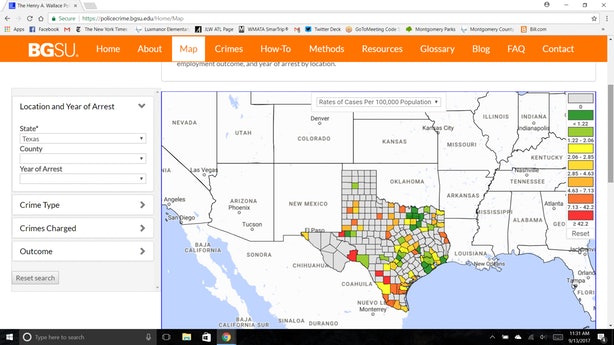National Police Crimes Database Could Improve Policing
The material could be particularly useful in raising awareness of the issue and in observing trends for intervention purposes. Henry A. Wallace Police Crime Database
Henry A. Wallace Police Crime Database
A public database of police crime has been released, the sole collection of data of its kind in the country. The news website Vice reveals the database creator’s motivation:
Twelve years ago, a criminal justice master’s student named Philip Stinson got into an argument with his grad school classmates about how often police officers committed crimes. His peers, many of whom were cops themselves, thought police crime was rare, but Stinson, himself a former cop and attorney, thought the problem was bigger than anyone knew. He bet a pint of ale that he could prove it.
The data set covers 2005 to 2012 and counts 8,006 arrests and 13,623 charges, involving 6,596 police officers. The data come from 2,830 local law enforcement agencies from all 50 states and Washington, D.C.—just a fraction of the 18,000 across the country. Most of the nation’s 18,000 law enforcement agencies have their own methods for tracking, analyzing and disseminating this type of information; however, most of them require information seekers to file Freedom of Information Act requests to gain access.
Stinson and his research team concluded that nearly half the noted incidents were violent.
Particularly striking are the sex offenses documented in the database: About 1,200 officers, or about a fifth of those included in the database, were arrested for sex crimes, including assisting or promoting prostitution, forcible fondling, forcible rape, forcible sodomy, incest, online solicitation of a child, pornography/obscene material, prostitution, sexual assault with an object, and statutory rape. In all, “17 percent of the officers arrested for sex crimes were charged in multiple sex-related cases, meaning they were either repeat offenders or had multiple victims,” an analysis concluded. More than half of the alleged victims were 17 or younger.
The federal government does not collect data on most arrests or convictions of officers, probably because it would heavily rely on self-reporting by the local agencies, and the Department of Justice does not mandate that any of this data be reported to it. Vice continues:
Norm Stamper, a former Seattle police chief and longtime officer for the San Diego Police Department, said there’s merit in taking a national look at criminal behavior among cops. Stamper contends there is a culture of impunity within law enforcement that hasn’t really changed since he started his career in 1966.
“There’s a tendency on the part of too many officers to abuse their authority,” Stamper said. “Too many officers whose first impulse is to cover their asses and try to cover up the misconduct or the crime. Too many supervisors who look the other way…”
Law enforcement experts reached by VICE News weren’t surprised by Stinson’s findings, especially the top three most common charges. They pointed in particular to the prevalence of domestic violence among cops, which studies have shown occurs at a rate two to four times higher than in the general population.
Stinson is adamant that the database should not be seen as anti-police and was quick to point out that officers often do not receive enough support in doing their job:
“We see signs where it’s obvious to us that people are unraveling personally and professionally, and we’re left scratching our heads wondering why their agencies hadn’t gotten them help they need,” Stinson said, pointing to cases where officers were arrested multiple times within a short period. “You know clearly there are all kinds of things going wrong in their life with post-traumatic stress, with mental health issues, with addiction issues, alcohol issues, drug issues.”
The database could be a particularly useful tool not only in disseminating information about crimes committed by police, but in allowing researchers to observe crime trends over time, and the relationship between those crimes and changes in police training, recruitment efforts, and so on. Stinson told WTOL-TV, “Sometimes people think this is anti-policing, that somehow we are trying to make law enforcement look bad,” Stinson said.
“And we don’t look at it that way at all. We are actually interested in improving policing.”
Your support matters…
Independent journalism is under threat and overshadowed by heavily funded mainstream media.
You can help level the playing field. Become a member.
Your tax-deductible contribution keeps us digging beneath the headlines to give you thought-provoking, investigative reporting and analysis that unearths what's really happening- without compromise.
Give today to support our courageous, independent journalists.






You need to be a supporter to comment.
There are currently no responses to this article.
Be the first to respond.